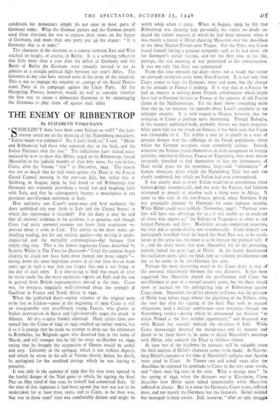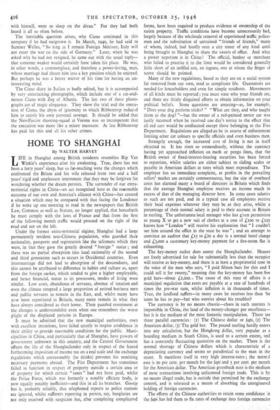THE ENEMY OF RIBBENTROP
By ELIZABETH WISKEMANN
" HOULDN'T there have been some Italians as well? " the hair-
dresser asked me on the morning of the Nuremberg executions. " Italian major war criminals? No, I don't think so," I said. " Hitler and Ribbentrop had those who repented shot in the back, and the Italian Partisans shot the rest." The indications have indeed accu- mulated by now to show that Hitler, urged on by Ribbentrop, forced Mussolini. to the judicial murder of their bite noire, his son-in-law, Ciano, after the Verona " trial" in December, 1943. The reason was not so much that he had voted againsi. the Duce at the Fascist Grand Council meeting in the previous July, but rather that at Salzburg, in August, 1939, he had dared to tell Ribbentrop that Germany was wantonly provoking a world war and breaking faith with Italy, and that he subsequently became a mouthpiece of me prevalent anti-German sentiment in Italy.
How authentic was C:ano's repentance and how authentic the diary published this year (bcth in Italy and the United States) .n which this repentance is recorded? For the diary it may be said that all external evidence so far confirms it as genuine, and though Ciano had many personal enemies one hears little scepticism -x- pressed about it even in Italy. The entries in the diary make
en- thralling reading, not for any stylistic quality—the writing is undis- tinguished and the mentality commonplace—but because they simply ring true. This is the almost ingenuous Ciano described by Sumner Welles in The Time for Decisiont—" Until the cameras began clicking he could not have been more human nor more simple "- noting down the most important events in all our lives live or more years ago in such a way that one forgets that one is not living in the day cf each entry. It is interesting to find that much of what he wrote reads like the more optimistic reports on Italy and the war in general from British representatives abroad at the time. Ciano was, for instance, singularly well-informed about the strength of Gaullism in France and North Africa in 1942.
When the published diary—earlier volumes of the original seem to be lost or hidden—opens at the beginning of 1939 Ciano is still an irresponsible very anti-French young Fascist, who glories in Italian intervention in Spain and light-heartedly urges the attack :n Albania. All this is quite frankly admitted. Many critics have pre- sumed that the Ciano of 1942 or 1943 touched up earlier entries, but if so it is strange that he made no attempt to drop out the references to Bombelles, the Belgrade agent who deceived him in the name of Macek, and still stranger that he left the entry on October .12, 1940, saying that he thought the occupation of Greece would be useful and easy. Certainly in the epilogue, which is not without dignity, and which he wrote in his cell at Verona shortly before his death, he apologised for the unedited jottings which he was leaving CO posterity.
It was only in the summer of 1939 that his eyes were opened to the fearful danger of the Nazi game to which, by signing the Steel Pact on May 22nd of that year, he himself had committed Italy. At the time of that signature it had been agreed that war was not to be undertaken for at least three years, and, to Ciano, as he then was, that war in three years' time was comfortably distant and might be worth while when it came. When in August, 1939, he felt that Ribbentrop was cheating him personally, his vanity no doubt in- duced the violent reaction of which he had been innocent when it was merely a matter of Hitler cheating Mussolini over the Anschluss or the three Munich Powers over Prague. For the Poles, too, Ciano found himself feeling a genuine sympathy such as he had never :elt for Germany's earlier victims, and for the first time in his life, perhaps, the real meaning of war penetrated to his consciousness. It was not only that Italy was unprepared.
From this time onwards the diary shows not a steady but rather an unsteady evolution away from Nazi-Fascism. It is not only that Ciano comes to hate the Germans more and more, but the change in his attitude to France is striking. It is true that as a Fascist he had an interest in writing down French collaboration which might have led to German favours to France at the expense of old Fascist claims in the Mediterranean. Yet the diary shows something more' than this in, for instance, his remarks about Laval's treachery to his unhappy country. It is with regard to Greece, however, that the evolution of Ciano is perhaps most interesting. Though Badoglio, in his recently published book, probably throws too much responsi- bility upon him for the attack on Greece, it has been seen that Ciano was favourable to it. Yet within a year he is clearly in a state of genuine dismay over the sufferings of the Greek population, about which the German occupiers seem completely callous. Indeed, wherever the Italians found themselves in joint occupation of foreign territory, whether in Greece, France or Yugoslavia, they were almost invariably horrified to find themselves in fact the instruments of Nazi world plans for the systematic large-scale " elimination " of human obstacles, plans which the Nuremberg Trial has only tob clearly confirmed, but which no Italian had ever contemplated.
It was utterly alien to every Italian tradition to exterminate other human beings systematically, and not even the Fascists had hitherto attempted to preach or practise such a thing even in Africa. It came to this only in the neo-Fascist period, when Northern Italy was practically annexed by Germany for some eighteen months. While Hitler could state publicly (November, 1941): " Partisan war- fare will have one advantage for us ; it will enable us to eradicate all those who oppose us," the Italians in Yugoslavia as often as not helped Partisans and Jews. Blackshirt groups committed atrocities, but they did so spasmodically, not systematically. Ciano himself Nag particularly horrified when he found the Steel Pact was to be totali- tarian in this sense too, the more so as he foresaw the political folly it ; and his diary shows that even Mussolini, for all his posturing, entirely lacked the gr:m logic of Hitler. As his health deteriorated his vacillation grew, until one finds him as violently pro-German one day as he seems to be anti-German the next.
Perhaps the most interesting motif in the Ciano diary is that of the personal relationship between the two dictators. It has been suggested that Mussolini played the pro-German and Ciano the anti-German as part of a mutual security game, but the diary would seem to account for the unforgiving rage of Ribbentrop against Ciano alone. Mussolini, for all his protests to Ciano, was the prisoner of Hitler long before 1943, almost the plaything of the Fiihrer, who, the very day after the signing of the Steel Pact with its mutual obligations, held a military conference—now notorious through me Nuremberg verdict—during which he announced the decision " to attack Poland at the first suitable opportunity," and discussed war with Britain but scarcely noticed the existence of Italy While Ciano increasingly detested the master-race and its masters and dared to let them know it, he came to dread Mussolini's meetings with Hitler, who reduced the Duce to helpless silence.
At least two of the incidents he recounts will be valuable when the final analysis of Hitler's character comes to be made. At Nurem- berg Hitler's raptures at the time of Mussolini's collapse over Austria were cited in Court. At Vienna two and a-half years after the Anschluss he repeated his gratitude to Ciano in the very same words, and " there were big tears in his eyes. What a' strange man." In the spring of 1942, when the dictators met at Klessheim, Ciano describes how Hitler again talked interminably while Mussolini suffered in silence. But in a sense the Germans, Ciano notes, suffered most, and, not merely the Germans but the Generals. Keitel nodded but managed to keep awake. Jodl, however, " after an epic struggle
with himself, went to sleep on the divan." For they had both heard it all so often before.
The inevitable question arises, why Ciano continued in this company if he had outgrown it. In March, 1940, he had said to Sumner Welles, " So long as I remain Foreign Minister, Italy will not enter the war on the side of Germany." Later, when he was asked why he had not resigned, he came out with the usual reply— that someone weaker would certainly have taken his place. He was, in other words, a commonplace, and therefore a power-loving, man. whose marriage had thrust him into a key position which he enjoyed. But perhaps he was a better mirror of his time for having an un- interesting mind.
The Ciano diary in Italian is badly edited, but it is accompanied by very entertaining photographs, which include one of a cat-and- mouse Ciano with Zog of Albania. The last two of these photo- graphs are of tragic eloquence. They show the trial and the execu- tion of Ciano, the abyss of ignominy to which Ribbentrop reduced him to satisfy his own personal revenge. It should be added that the Neo-Fascist shooting-squad at Verona was so incompetent that the execution was more like a minor massacre. At last Ribbentrop has paid for this and all his other crimes.































 Previous page
Previous page